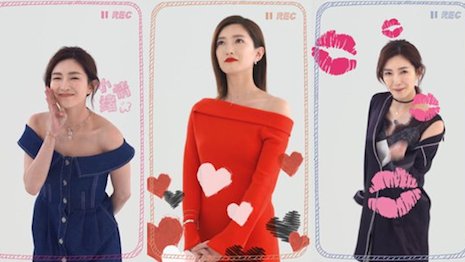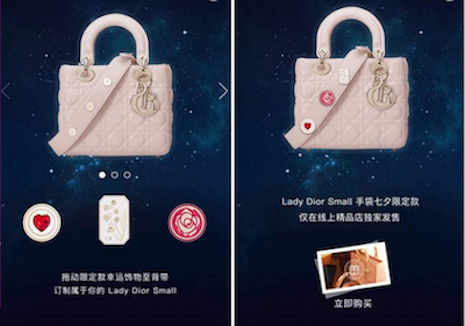 WeChat has launched its own "stories" feature. Image credit: Swarovski
WeChat has launched its own "stories" feature. Image credit: Swarovski
Chinese social media platform WeChat is following in the footsteps of Snapchat and Instagram with the launch of its own “stories” feature, giving luxury brands the opportunity to share ephemeral content on the popular application.
Dubbed “Time Capsules,” the feature allows WeChat's more than 1 billion monthly active users to upload videos that disappear after a 24 hour period, a departure for the mobile application that typically emphasizes utility and productivity. Luxury brands often rely on WeChat to reach elusive Chinese consumers, and Time Capsules has the potential to change their tactics.
“WeChat, as the dominant social media for over 1 billion people in over 70 countries, should be foundational for any luxury brand's global ambitions,” said Kenan Frager, vice president of marketing at Pixlee, San Francisco. “Any large social community of fans who create authentic content needs to be purposefully amplified and leveraged by brands to find new customers and increase loyalty in 2019.”
Time capsules
Time Capsule videos can be enhanced with stickers, location tags and music, similar to other video-sharing apps. Videos last for up to 10 seconds, and users are limited to posting no more than nine a day.
Currently, WeChat users can view a Time Capsule by clicking on a blue circle that appears next to the profile picture of a contact that has shared a video. The ring is seen next to users in one-on-one chats, group chats and the moments newsfeed.
Dior's mini program on WeChat
To interact with their friends' stories, users can send digital speech bubbles or leave comments.
The user experience for WeChat's Time Capsule differs from Instagram and Snapchat in which the temporary videos, including those from brands, are featured more prominently. Through a Stories Highlight feature, Instagram also allows users to archive and share videos past the 24 hour expiration date without being posted on the newsfeed.
In 2018, Instagram also introduced IGTV, a new home base for the platform’s expanded video offerings, including hour-long videos and curated films. Instagram is banking on the long-form vertical videos as a way of helping brands get even closer to their audiences, building engagement for the platform’s brand partners (see story).
Instagram has incorporated additional capabilities for its Stories. Image credit: Instagram
“The minor differences that set Time Capsule apart from Instagram Stories and Snapchat aren’t as important as what makes them similar,” Pixlee's Mr. Frager said. “From our experience, any form of video content that can be made shoppable performs incredibly well as it is personable and authentic.
“Time Capsule will allow WeChat to do what Instagram has already seen great success at,” he said. “Creating highly authentic video content that is relatable and tells the brand story is invaluable for any luxury brand's expansion plans.”
Luxury and WeChat
Leveraging digital strategies to reach Chinese affluents is vital for luxury brands, particularly because cultural norms and the Great Firewall reduce the impact of the social media campaigns.
Mini programs, which function as sub-applications within WeChat, have especially gained traction among luxury brands.
Luxury group Kering recently updated its digital strategy, which includes every Kering brand having its own WeChat mini program to enhance relationships with Chinese shoppers. A China-based client and digital team will also be responsible for adapting digital strategies to the Chinese market (see story).
The majority of consumers in China are using mobile messaging application WeChat as their sole source for interaction with brands, daily tasks and communication with others, and marketers are learning how to leverage this to their advantage and recreate this tactic overseas.
WeChat is now seeing double adoption rates within two years, according to a recent report from L2, also showing that now all beauty brands, 96 percent of personal care brands and 90 percent of watch and jewelry manufacturers interact with consumers (see story). Brands in China are serving consumers' needs through the mobile messaging platform, a strategy that can be and should be recreated in the United States (see story).
As WeChat continues to grow, brands are willing to spend on the platform to get noticed. The WeChat Luxury Index by Digital Luxury Group and JINGdigital found that consumers most often interact with the menu button on a brand's account, with this action representing 62 percent of all brand engagements on the platform (see story).
“The most important thing for brands with short-form social video content – WeChat stories, Instagram Stories and Snapchat – is not the size of someone's audience, but the brand's ability to find, collect, permission and use that content,” Pixlee's Mr. Frager said. “Brands who are agile enough to take customer's authentic social story content and make those videos shoppable into brand emails, Web sites, in-store display and back into social as ads are the winners in the new direct-to-consumer economy.”

